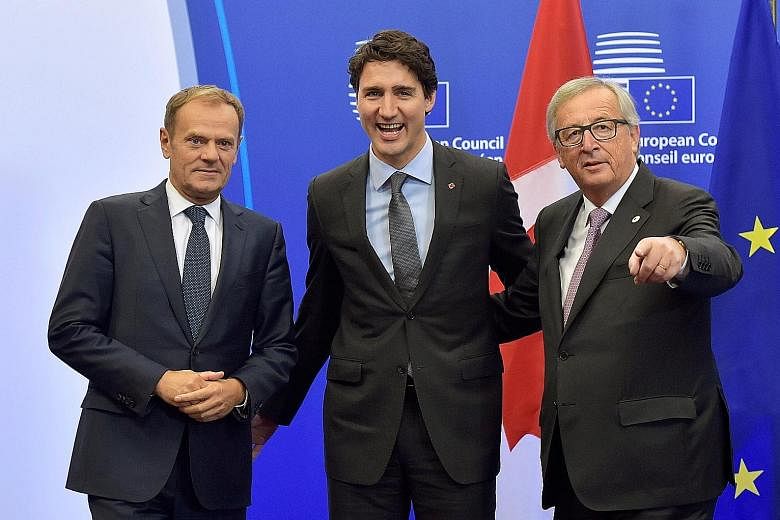BRUSSELS • The European Union and Canada signed a free trade agreement yesterday that aims to generate jobs and growth, though it must still clear some 40 national and regional parliaments in Europe in the coming years to enter fully into force.
Canadian Prime Minister Justin Trudeau signed the treaty along with the heads of EU institutions, a step that should enable a provisional implementation of the pact early next year with the removal of most import duties.
The Comprehensive Economic and Trade Agreement's (Ceta) passage has not been smooth.
French-speakers in southern Belgium, who are a minority within their own small country and account for less than 1 per cent of the 508 million EU consumers likely to be affected by Ceta, raised objections that held up the deal until a breakthrough on Thursday, confirmed by regional parliamentary votes on Friday.
"All's well that end's well," said European Commission president Jean-Claude Juncker.
"We have 20 ongoing negotiations and today we are fixing the global standards the European Union and the European Commission want others to accept."
The Canada agreement is seen as a springboard to a larger EU deal with the United States, known as the Transatlantic Trade and Investment Partnership (TTIP), which has been the target of labour unions and environmental and other protest groups.
EU Trade Commissioner Cecilia Malmstrom said TTIP talks were not dead, contrary to what some politicians in Germany and France have said, but would need to wait for the next US president - taking office in January - to resume.
Supporters say Ceta will increase Canadian-EU trade by 20 per cent and boost the EU economy by €12 billion (S$18.3 billion) a year and Canada's by C$12 billion (S$12.5 billion).
For Canada, the deal is important to reduce its reliance on the neighbouring US as an export market.
For the EU, it is a first trade pact with a G-7 country and a success plucked from the jaws of defeat at a time when the bloc's credibility has taken a beating from Britain's vote in June to leave after 43 years of membership.
"This has been a very long process. A huge majority of people in Europe are in favour of Europe, but there are concerns and we need to engage with them," Ms Malmstrom said. "The commission cannot do that alone."
Some 100 anti-globalisation protesters clashed with police officers outside the venue in Brussels, trying to break down barriers in front of the main entrance of the building and splashing red paint.
The signing yesterday will not be the last act. Assuming the European Parliament gives its assent, Ceta could come into force partially early next year.
However, full implementation, which would include a contentious investment protection system, will ensue only after clearance by more than three dozen national and regional Parliaments.
REUTERS

